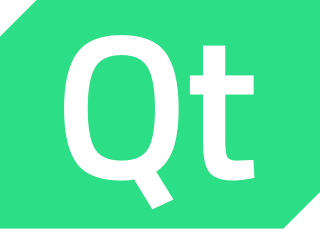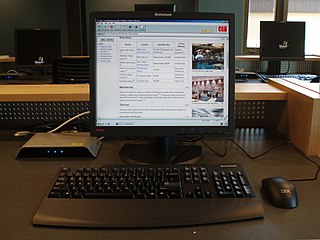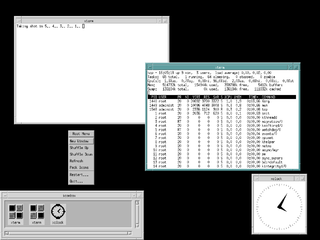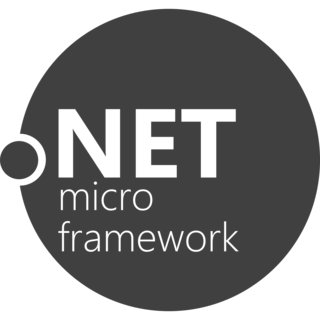
A Linux distribution is an operating system made from a software collection that includes the Linux kernel and often a package management system. Linux users usually obtain their operating system by downloading one of the Linux distributions, which are available for a wide variety of systems ranging from embedded devices and personal computers to powerful supercomputers.

Qt is cross-platform application development framework for creating graphical user interfaces as well as cross-platform applications that run on various software and hardware platforms such as Linux, Windows, macOS, Android or embedded systems with little or no change in the underlying codebase while still being a native application with native capabilities and speed.

In computer networking, a thin client, sometimes called slim client or lean client, is a simple (low-performance) computer that has been optimized for establishing a remote connection with a server-based computing environment. They are sometimes known as network computers, or in their simplest form as zero clients. The server does most of the work, which can include launching software programs, performing calculations, and storing data. This contrasts with a rich client or a conventional personal computer; the former is also intended for working in a client–server model but has significant local processing power, while the latter aims to perform its function mostly locally.

The X Window System is a windowing system for bitmap displays, common on Unix-like operating systems.

In computing, Motif refers to both a graphical user interface (GUI) specification and the widget toolkit for building applications that follow that specification under the X Window System on Unix and Unix-like operating systems. The Motif look and feel is distinguished by its use of rudimentary square and chiseled three-dimensional effects for its various user interface elements.

wxWidgets is a widget toolkit and tools library for creating graphical user interfaces (GUIs) for cross-platform applications. wxWidgets enables a program's GUI code to compile and run on several computer platforms with no significant code changes. A wide choice of compilers and other tools to use with wxWidgets facilitates development of sophisticated applications. wxWidgets supports a comprehensive range of popular operating systems and graphical libraries, both proprietary and free.
DirectFB was a software library with a small memory footprint that provides graphics acceleration, input device handling and abstraction layer, and integrated windowing system with support for translucent windows and multiple display layers on top of the Linux framebuffer without requiring any kernel modifications. DirectFB is free and open-source software subject to the terms of the GNU Lesser General Public License (LGPL).

Kodi is a free and open-source media player and technology convergence software application developed by the Kodi Foundation, a non-profit technology consortium. Kodi is available for multiple operating systems and hardware platforms, with a software 10-foot user interface for use with televisions and remote controls. It allows users to play and view most streaming media, such as videos, music, podcasts, and videos from the Internet, as well as all common digital media files from local and network storage media, or TV gateway viewer.
Linux Terminal Server Project (LTSP) is a free and open-source terminal server for Linux that allows many people to simultaneously use the same computer. Applications run on the server with a terminal known as a thin client handling input and output. Generally, terminals are low-powered, lack a hard disk and are quieter and more reliable than desktop computers because they do not have any moving parts.
The MicroBlaze is a soft microprocessor core designed for Xilinx field-programmable gate arrays (FPGA). As a soft-core processor, MicroBlaze is implemented entirely in the general-purpose memory and logic fabric of Xilinx FPGAs.

Lazarus is a cross-platform, integrated development environment (IDE) for rapid application development (RAD) using the Free Pascal compiler. Its goal is to provide an easy-to-use development environment for developing with the Object Pascal language, which is as close as possible to Delphi. It is free and open-source software with different parts released under different software licenses.

KDE Platform 4 was a collection of libraries and software frameworks by KDE that served as technological foundation for KDE Software Compilation 4 distributed under the GNU Lesser General Public License (LGPL). KDE Platform 4 was the successor to KDElibs and the predecessor of KDE Frameworks. KDE Platform 4 is the only version of KDE Platform, and in 2013 it was replaced by KDE Frameworks 5.

Linux is a family of open-source Unix-like operating systems based on the Linux kernel, an operating system kernel first released on September 17, 1991, by Linus Torvalds. Linux is typically packaged as a Linux distribution (distro), which includes the kernel and supporting system software and libraries, many of which are provided by the GNU Project. Many Linux distributions use the word "Linux" in their name, but the Free Software Foundation uses and recommends the name "GNU/Linux" to emphasize the use and importance of GNU software in many distributions, causing some controversy.

The .NET Micro Framework (NETMF) is a .NET Framework platform for resource-constrained devices with at least 512 kB of flash and 256 kB of random-access memory (RAM). It includes a small version of the .NET Common Language Runtime (CLR) and supports development in C#, Visual Basic .NET, and debugging using Microsoft Visual Studio. NETMF features a subset of the .NET base class libraries, an implementation of Windows Communication Foundation (WCF), a GUI framework loosely based on Windows Presentation Foundation (WPF), and a Web Services stack based on Simple Object Access Protocol (SOAP) and Web Services Description Language (WSDL). NETMF also features added libraries specific to embedded applications. It is free and open-source software released under Apache License 2.0.
A Bluetooth stack is software that is an implementation of the Bluetooth protocol stack.
Perst is an open source, dual license, object-oriented embedded database management system (ODBMS). Both the Java programming language, and the C# programming language versions are compact and Perst has been implemented on smart phones running the Android and Windows Phone (WP7) operating systems.
In computing, SPICE is a remote-display system built for virtual environments which allows users to view a computing "desktop" environment – not only on its computer-server machine, but also from anywhere on the Internet – using a wide variety of machine architectures.
OpenLMI provides a common management infrastructure for Linux systems. Available operations include configuration of various operating system parameters and services, hardware components configuration, and monitoring of system resources. Services provided by OpenLMI can be accessed both locally and remotely, using multiple programming languages and standardized APIs.












